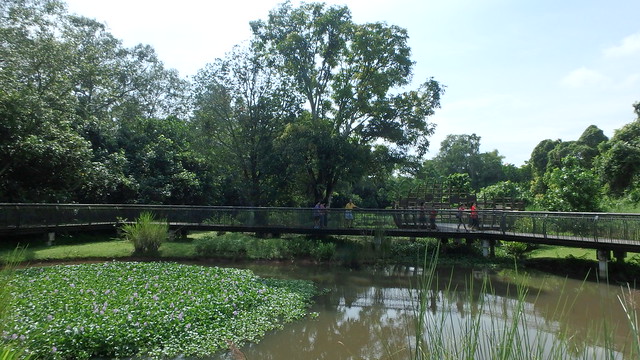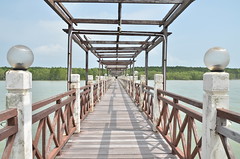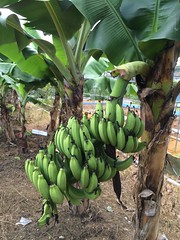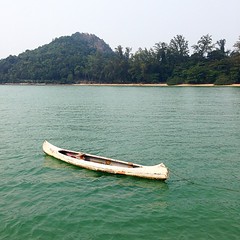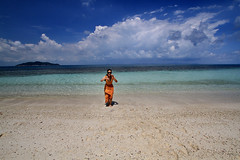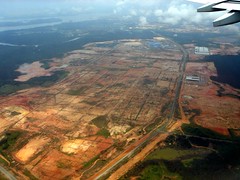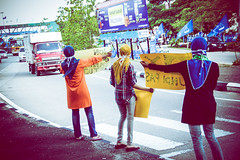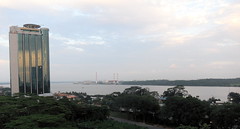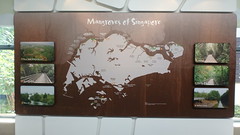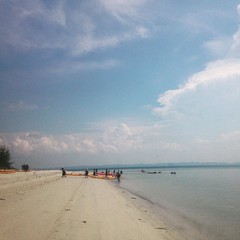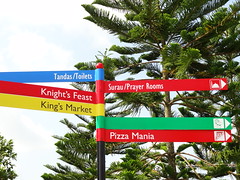Johor
Johor (English: /əˈh/; Malay: [d͡ʒoho(r)]), also spelled as Johore, is a state of Malaysia in the south of the Malay Peninsula. Johor has land borders with the Malaysian states of Pahang to the north and Malacca and Negeri Sembilan to the northwest. Johor shares maritime borders with Singapore to the south and Indonesia to both the west and east. Johor Bahru is the capital city and the economic centre of the state, Kota Iskandar is the seat of the state government, and Muar serves as the royal capital of the state. Johor Lama served as the old state capital during the period of the Johor Sultanate. As of 2020, the state's population is 4.01 million, making it the second most populated state in Malaysia. Johor has highly diverse tropical rainforests and an equatorial climate. Situated at the southern foothills of the Tenasserim Hills, inselbergs and massifs dominate the state's flat landscape, with Mount Ledang being the highest point. Johor Bahru is one of the anchor cities of the Iskandar Malaysia development corridor, which is one of the most densely populated and fastest-growing urban areas in Malaysia.
Johor has high diversity in ethnicity, culture, and language. The state is known for its traditional dance of zapin and Kuda kepang. The head of state is the Sultan of Johor, while the head of government is the Menteri Besar. The government system is closely modelled on the Westminster parliamentary system, with the state administration divided into administrative districts. Islam is the state religion per the 1895 Constitution of Johor, but other religions can be freely practised. Both Malay and English have been accepted as official languages for the state since 1914.
The economy is mainly based on services and manufacturing sectors. Johor is one of the main economic powerhouses in Malaysia and is currently among the top 4 contributors to the national gross domestic product, along with Selangor, Kuala Lumpur and Sarawak. It is also one of the most vital international trade centres in Malaysia, with Port of Tanjung Pelepas being the 15th busiest port in the world, as well as the busiest container port in the nation.
Etymology
The area was first known to the northern inhabitants of Siam as Gangganu or Ganggayu (Treasury of Gems) due to the abundance of gemstones near the Johor River. Arabic traders referred to it as , a word borrowed from the Persian , which also means 'precious stone' or 'jewel'. As the local people found it difficult to pronounce the Arabic word in the local dialect, the name subsequently became Johor. Meanwhile, the Old Javanese eulogy of Nagarakretagama called the area ('land's end'), as it is the southernmost point of mainland Asia. Another name, through Portuguese writer Manuel Godinho de Erédia, made reference to Marco Polo's sailing to (the end of the Malay Peninsula land) in 1292. Both and had been mentioned since before the foundation of the Sultanate of Malacca. Throughout the period, several other names also co-existed such as , and . Johor is also known by its Arabic honorific as or 'Abode of Dignity'.
History
Hindu-Buddhist Era
A bronze bell estimated to be from 150 A.D. was found in Kampong Sungai Penchu near the Muar River. The bell is believed to have been used as a ceremonial object rather than a trade object as a similar ceremonial bell with the same decorations was found in Battambang Province, Cambodia, suggesting that the Malay coast came in contact with Funan, with the bell being a gift from the early kingdom in mainland Asia to local chieftains in the Malay Peninsula. Another important archaeological find was the ancient lost city of Kota Gelanggi, which was discovered by following trails described in an old Malay manuscript once owned by Stamford Raffles. Artefacts gathered in the area have reinforced claims of early human settlement in the state. The claim of Kota Gelanggi as the first settlement is disputed by the state government of Johor, with other evidence from archaeological studies conducted by the state heritage foundation since 1996 suggesting that the historic city is actually located in Kota Tinggi District at either Kota Klang Kiu or Ganggayu. The exact location of the ancient city is still undisclosed, but is said to be within the forest reserve where the Lenggiu and Madek Rivers are located, based on records in the Malay Annals that, after conquering Gangga Negara, Raja Suran from Siam of the Nakhon Si Thammarat Kingdom (Ligor Kingdom) had sailed to Ganggayu. Since ancient times, most of the coastal Malay Peninsula has had their own rulers, but all fell under the jurisdiction of Siam.
Sultanate of Johor
After the fall of Malacca in 1511 to the Portuguese, the Johor Sultanate, based on the descendants of the Malaccan Sultanate, was founded by Mahmud's son, Ala'udin Ri'ayat Shah II, in 1528 when he moved the royal court to the Johor River and set up his royal residence in Johor Lama. Johor became an empire spanning the southern Malay Peninsula, Riau Archipelago (including Singapore), Anambas Islands, Tambelan Archipelago, Natuna Islands, a region around the Sambas River in south-western Borneo and Siak in Sumatra together with allies of Pahang, Aru and Champa, and it aspired to retake Malacca from the Portuguese. The Aceh Sultanate in northern Sumatra had the same ambition, which led to a three-way war among the rivals. During the wars, the Johor administrative capital moved several times based on military strategies and to maintain authority over trading in the region. Johor and the Portuguese began to collaborate against Aceh, which they saw as a common enemy. In 1582 the Portuguese helped Johor thwart an attack by Aceh, but the arrangement ended when Johor attacked the Portuguese in 1587. Aceh continued its attacks against the Portuguese, and was later destroyed when a large armada from the Portuguese port in Goa came to defend Malacca and destroy the sultanate.
After Aceh was left weakened, the Dutch East India Company (VOC) arrived and Johor formed an alliance with them to eliminate the Portuguese in the second capture of Malacca in 1641. Johor regained authority over many of its former dependencies in Sumatra, such as Siak (1662) and Indragiri (1669), which had fallen to Aceh while Malacca was taken by the Dutch. Malacca was placed under the direct control of Batavia in Java. Although Malacca fell under Dutch authority, the Dutch did not establish any further trading posts in the Malay Peninsula and Sumatra, as they had less interest than what they had over Java and Maluku Islands. Only when the Bugis began to threaten Dutch maritime trade did they become involved with local disputes.
The dynasty of the Malaccan descendants lasted until the death of Mahmud II, when it was succeeded by the Bendahara Dynasty, a dynasty of ministers who had previously served in the Malacca Sultanate. The Dutch felt increasingly threatened in the 18th century, especially when the English East India Company started to establish a presence in the northern Malay Peninsula, leading the Dutch to seize the Bugis areas of Riau and expel the Bugis from both Riau and Selangor so these areas would not fall under British rule. This ended Bugis political domination in the Johor-Pahang-Riau empire, resulting in the Bugis being banned from Riau in 1784. During the rivalry between the Bugis and Dutch, Mahmud Shah III concluded a treaty of protection with the VOC on board the HNLMS Utrecht and the sultan was allowed to reside in Riau with Dutch protection. Since then, mistrust between the Bugis and Malay escalated. From 1796 to 1801 and from 1807 to 1818, Malacca was placed under British Residency as the Netherlands were conquered by France in the Napoleonic Wars, but it was returned to the Dutch in 1818. Malacca served as the staging area for the British victory in 1811.
British protectorate
After the death of Mahmud Shah III, the sultan left two sons through commoner mothers. While the elder son Hussein Shah was supported by the Malay community, the younger son Abdul Rahman Muazzam Shah was supported by the Bugis community. In 1818, the Dutch recognised Abdul Rahman Muazzam Shah as the legitimate heir to the Johor Empire in return for his supporting their intention to establish a trading post in Riau. The following year, the British recognised Hussein Shah as the legitimate heir to the Johor Empire in return for his supporting their intention to establish a trading post in Singapore. Before his death, Mahmud Shah III had appointed Abdul Rahman as the Temenggong for Johor with recognition from the British as the legitimate Temenggong of Johor-Singapore, marking the beginning of the Temenggong Dynasty. Abdul Rahman was succeeded by his son, Daeng Ibrahim, although his recognition by the British only occurred 14 years later.
With the partition of the Johor Empire due to the dispute between the Bugis and Malay and following the defined spheres of influence for the British and Dutch resulting from the Anglo-Dutch Treaty of 1824, Daeng Ibrahim intended to create a new administrative centre for the Johor Sultanate under the new dynasty. As he maintained a close relationship with the British and the latter wanted to have full control over trade in Singapore, a treaty was signed between Daeng Ibrahim and Hussein Shah's successor, Ali Iskandar, recognising Ali as the next sultan. Through the treaty, Ali was crowned as the sultan and received $5,000 (in Spanish dollars) and an allowance of $500 per month, but was required to cede the sovereignty of the territory of Johor (except Kesang of Muar, which would be the only territory under his control) to Daeng Ibrahim.
With the establishment of a new capital in mainland Johor, the administrative centre was moved from Telok Blangah in Singapore. As the area was still an undeveloped jungle, the Temenggong encouraged the migration of Chinese and Javanese to clear the land and develop an agricultural economy in Johor. During his reign, Johor began t…
Looking for places related to Johor?
Those are other destinations to find places related to Johor:
